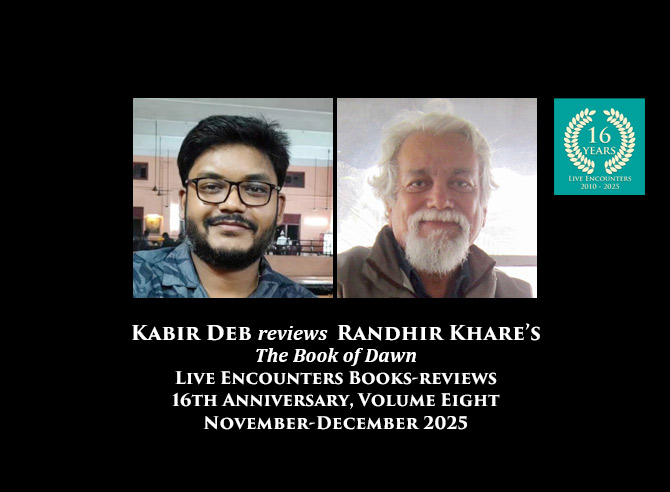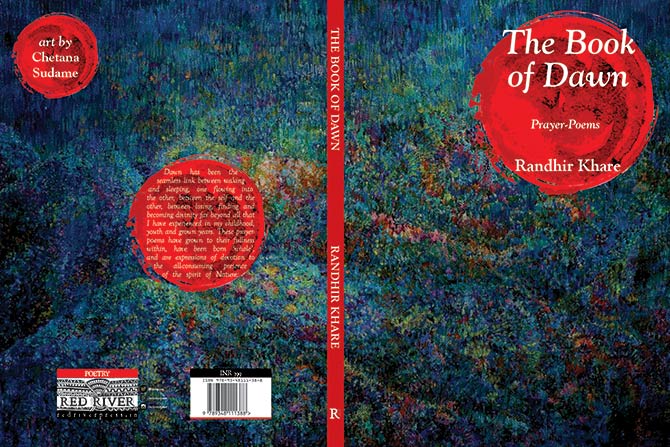
Live Encounters Books-Reviews Volume Seven
November- December 2025
Kabir Deb Review of
The Book of Dawn – Prayer-Poems by Randhir Khare.
Red River Press, 2025

The existence is a vast unit and we are tiny dots with maximum potential and kinetic energy. But with time, the latter fizzes out because of exhaustion and some mundane occurrences while the former stays with certain disturbances. Yet the potential energy makes a significant contribution in introducing us to a world beyond our limits. This does not mean that it adds a magical conspiracy to our cosmic appetite. Rather, we find a way to delimit ourselves and expand our horizon without pondering on the consequences. After experiencing a sufficient span of this existence, we trickle in whatever way possible to reach the objective to sharpen our senses and reduce chaos and noise.
Randhir Khare’s ‘The Book of Dawn: Prayer-Poems’, addresses the expanding ‘self’ of the poet as he dissolves himself in nature, the divine power (by not being particular) and finds contentment in being one, with everything and nothing. He dilutes the thin line between prayer and poetry since they have a trait to complement each other when needed. His pieces read like poems, but deep inside, they have their cries, urges and calling, thus making them prayers.
These are not spiritual poems since they have the tendency to talk about instances where neither metaphysics nor any supernatural element gets involved. Even then, the poems are directed towards an entity that can only be felt or evoked when the dive is channelised within. ‘Dawn’ here is an image which plays the role of a catalyst. Since it refers to the beginning of the day, the first light, the time of silence and has the presence of a certain peace, both the time and word is used often to strengthen the poems, their intent and what the poet has in his mind.
Khare’s prayers come in chains and loop since this is how the human mind thinks as one thought has to rejuvenate into another by being beads of a single string. His first prayer is where, for the first time, he discovers that his identity is mortal and is capable of evaporating. The idea of being one with both death and life is significant because it keeps us grounded. It is not fear or joy. Rather, it is the uncertainty of experiencing this transition that humbles our magnanimous pride over what we possess or attain. Senses operate in a better way when the mind is awakened and so, the poet’s existence is about experiencing everything that carves and constructs the body of nature.
Khare says that only after being nothing, one can become everything – a seed sprouts into a big tree – a collection of dust particles makes the sky blue. Even a grain of dust consists of the entire cosmos.
“There are mass graves around me, inside me. I am one of them and what remains is the mist flooded night talking with owls.”
In the fourth prayer-poem, we get to read the decision of the poet to empty himself of everything. But this is not where anyone approaches with logic and concrete understanding. The concept is absurd but necessary because while living in this world, we are filling us up with voices, instances, memories, locations, which leave less space for anything substantial. To become something, one has to shed whatever he wears, even if they keep us tethered to an identity. The mind and body work in unison and to keep them functional, people must empty themselves by putting effort on both the agents. Body can be squeezed into water and breath. Mind can emanate out its thoughts.
“In emptiness there is space enough to grow, become, un-become, and grow again till the heart, filled with stardust, becomes everything there ever was and I am free.”
The eighth prayer addresses how the human body wakes up from a long sleep. This sleep can be an image of our lack of conscience or a physical or mental exhaustion. We are susceptible to it in our daily life and sometimes, we get the opportunity to nudge ourselves slowly but intensely to come out of this dormant death. Khare redefines light for us to thrust into us its effectiveness and unadulterated form. It is not there to just free us from sleep. It is also there to take us out of the land of illusions which becomes our temporary reality – to construct us again into our original self.
“We are creatures of light, illumined from within, and yet we let the dark drive us through nightmares and stumble us through night in search of day until it is dusk.”
In his twenty-third prayer poem, we come across the observer in the poet. This observation is required to transform ourselves from inside since our external part is what we fail to control. But to feed on what we get to see before us liberates us as projections of possibilities illuminate before our very eyes. In that particular moment, like Khare writes, we wonder about the restrictions we create around us only to become social beings. Hope comes when our entirety has the liberty to choose and experience whatever it needs. Only in this particular state of mind, we will be able to create a better society. Our words will be remembered and everything we do would have an impact. This is a form of prayer or meditation where we get clarity about what we want to attain and keep.
“I wait –
For the cracking of the shell
For the yolk to ooze,
For my voice to become
The voice of another,
For the word
To curl in my palm,
For each breath to become a prayer bead,
Still.”
We get heavier every day with our own and everyone else’s expectations, hope and wishes. It cannot be coined as burden, but it takes with it a significant part of our life. In his thirty-fourth prayer-poem, Khare is talking to the Divine One, without making it precise since anything that’s in your conscience does not expect highlighting. The poet is free of the emotions which hold us back and internalizes the thought of every moment sprouting something new and important.
He even considers the droplets of rain falling of the leaves as gifts which cannot be measured but they reconfigure our body-mind unison. The poet also believes that once we are one with divinity, we lose our interim identity. What remains with us is an experience, an essence, an emotion, a transcendental echo of transformation.
“I am the one spinning like a crystal ball, the past and future merging in its light.
I am you and you are me. I trust the moment.”
Randhir Khare’s collection of prayer poems “The Book of Dawn”, gives us insight into the personal methods of working towards the divine and develop his inner being. The poems might appear as preachy and can be repetitive, but anything that’s an echo will repeat the source of the sound. Readers have to devour them with ease to process what each poem has to say. The book is an accumulative voice and the purpose is to bridge the gaps between the prayer-poems and then to allow them to stitch our own voids. It is an important collection to liberate us from within.
© Kabir Deb
Kabir Deb is a writer based in Karimganj, Assam. He is the recipient of Social Journalism Award, 2017; Reuel International Award for Best Upcoming poet, 2019; Nissim International Award, 2021 for Excellence in Literature for his book Irrfan: His Life, Philosophy and Shades. He reviews books, many of which have been published in national and international magazines. His last book, The Biography of The Bloodless Battles has been shortlisted for Sahitya Akademi Yuva Puraskar, 2025 and Muse India Young Writer’s Award, 2024. He works as the Interview Editor for the Usawa Literary Review.
Randhir Khare is a national and international award-winning poet, writer, artist, teacher and folklorist. He has thirty-nine books to his credit, performed his poetry in twelve concerts, exhibited his art in seven solo shows and has inspired the work of photographers, artists and actors, and has collaborated with A.R Rahman who has set his poems to music. He is the recipient of the Sanskriti Award for Creative Writing, the Sahitya Akademi’s Residency Award, The Palash Award for Lifetime Achievement in Education and Culture, The Pegasus Gold Medal for Poetry awarded by the Union of Bulgarian Writers and a host of other prizes that recognise his contribution to literature and Education. As director of The Rewachand Bhojwani Academy in Pune he has introduced a number of arts and literature programmes including the Library Alive project. Two books, THE BOOK OF DAWN and TARA, THE DOG WHO ALWAYS WAS have just been released. https://www.randhirkhare.in/

